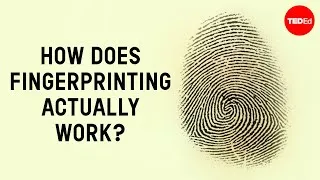请双击下面的英文字幕来播放视频。
翻译人员: Rana Al kilaney
校对人员: Lexi Ding
00:07
It was June 2010.
0
7086
2294
2010 年 6 月,
00:09
Inside the Scripps National Spelling Bee,
1
9464
2544
在全美拼字比赛中,
00:12
contestants between 8- and 15-years-old
wrestled words
2
12008
3879
8 到 15 岁的参赛者们
艰难地应对着
00:15
like brachydactylous and leguleian.
3
15887
3587
诸如 brachydactylous
和 leguleian 这样的单词。
00:20
Outside, a crowd protested the complexity
of English spelling conventions.
4
20058
5422
而在比赛现场外面,民众正在
抗议复杂的英语拼写惯例。
00:25
Indeed, spelling reformers have
been around for centuries,
5
25772
3211
事实上,拼写改革者
已经存在了几个世纪,
00:28
advocating for overarching changes to make
English spelling more intuitive.
6
28983
4880
他们主张进行全面变革,
使英语拼写更加简便。
00:34
The English language is chock-full
of irregularities.
7
34113
3587
英语这种语言充满了不规则性。
00:37
One commonly used example of this:
take the “g-h” sound from “enough,”
8
37950
5548
举个常用的例子:
取 “enough”中 “g-h” 的发音、
00:43
the “o” sound from “women,”
and the “t-i” sound from “action,”
9
43664
5631
“woman” 中 “o” 的发音
和 “action” 中 “t-i” 的发音,
00:49
and you could argue that
“g-h-o-t-i” spells “fish.”
10
49378
5214
你就能说 “g-h-o-t-i” 拼作 “fish”。
00:54
So, how did English get like this?
11
54926
2878
那么,英语是怎么演变成这样的呢?
00:59
English arose from old Germanic
tribes that invaded the British Isles
12
59514
4296
英语起源于 1500 多年前
01:03
more than 1,500 years ago.
13
63810
2919
入侵不列颠群岛的古日耳曼部落。
01:06
Their languages coalesced and evolved
into Old English.
14
66979
4421
他们的语言融合并演变为古英语。
01:12
When Roman missionaries arrived
around 600 CE,
15
72485
3629
当罗马传教士在公元 600 年
前后到达不列颠群岛后,
01:16
they devised ways to write it
down using the Latin alphabet,
16
76114
3920
他们想出了用拉丁字母
来书写古英语的方法,
01:20
supplementing it with some Germanic runes
for sounds they didn’t have letters for.
17
80118
5046
对于没有拉丁字母能表示的发音,
就用一些日耳曼符文来补充。
01:25
Then came the Norman invasion of 1066
when French speakers conquered England.
18
85581
6006
然后是 1066 年的诺曼入侵,
法语使用者征服了英格兰。
01:31
French became the language
of authority and high society.
19
91796
3754
法语成为官方和上流社会的语言。
01:35
But English remained the dominant
spoken language.
20
95633
3670
但是英语仍然是主要的口语。
01:39
Over time, those descended from French
speakers also became English speakers,
21
99554
4921
慢慢地,法语使用者的后代
也开始说英语了,
01:44
but some French words snuck
into the language.
22
104517
2919
但有些法语单词则进入了英语中。
01:47
Some English speakers were also familiar
with Latin through the church
23
107812
3837
一些英语使用者还通过
教会和正规教育
01:51
and formal education.
24
111649
1376
熟悉了拉丁语。
01:53
By the mid-1400s, people were writing
in English again—
25
113442
3754
到了 15 世纪中期,
人们又开始用英语写作,
01:57
but it was unstandardized.
26
117363
2002
但当时的英语还没有标准化。
01:59
They used a mix of influences to determine
word choice and spelling,
27
119615
4171
人们综合多种因素来确定
单词的选择和拼写方法,
02:03
including the French they knew,
the Latin they studied,
28
123911
2962
包括他们认识的法语、学过的拉丁语
02:06
and the English they spoke.
29
126873
1751
和他们所说的英语。
02:09
So, things were already pretty messy.
30
129041
3379
因此,到这儿英语就已经很混乱了。
02:12
Then, in 1476, the printing press
arrived in England.
31
132503
4922
接着,1476 年,
印刷机进入英格兰。
02:17
Some of the people working the presses
may have mainly spoken Flemish—
32
137675
4087
一些在新闻界工作的人
可能主要讲佛兰德语,
02:21
not English.
33
141804
1043
而不是英语。
02:22
And they were given manuscripts
that varied widely in their spelling.
34
142889
3920
他们收到的手稿拼写差异很大。
02:27
Without standardization, different writers
went with various spellings
35
147185
4295
由于英语书写没有标准化,
02:31
based in part on what they happened
to encounter while reading.
36
151480
3963
作家们会根据他们在阅读时
遇到的情况而使用不同的拼写。
02:35
Many words had a multitude of spellings.
37
155818
3045
许多单词有很多种拼写。
02:38
The word “dough,” for instance,
38
158946
2294
比如说 “dough” 这个词,
02:41
used to be spelled in all these ways
and was originally pronounced “dach.”
39
161282
5547
曾被拼写为以上这些形式,
它最初的发音是 “dach”。
02:46
The guttural Germanic sound it ended with
was one the Latin alphabet didn’t cover.
40
166954
5631
它结尾的日耳曼语喉音
没有对应的拉丁字母代表,
02:52
It eventually came to be
represented with “g-h.”
41
172752
3545
最终以 “g-h” 表示。
02:56
But, for some “g-h” words,
42
176339
2002
但是,有些带 “g-h” 的单词,
02:58
English speakers eventually dropped
the guttural sound altogether;
43
178341
3962
英语使用者最终
完全去掉了这个喉音;
03:02
for others, they ended up pronouncing
it as “f” instead,
44
182345
3795
有些单词中的这个喉音
最终被 “f” 代替了,
03:06
as exemplified in “dough” versus “tough.”
45
186265
3671
比如 “dough” 和 “tough”。
03:10
Printing presses memorialized
the spelling
46
190186
2461
尽管发音最终发生了变化,
03:12
even though the pronunciation
eventually changed.
47
192647
3461
但印刷机记住了它们的拼写。
03:16
And this wasn’t just the case with “g-h.”
48
196108
2503
不仅仅只是 “g-h”
存在这种情况。
03:18
Some letters in other words
also fell silent:
49
198778
2919
有些字母在其他单词中也不发音:
03:21
words like knife, gnat, and wrong
50
201822
3421
像 knife、gnat 和 wrong,
03:25
all contain the vestiges
of past pronunciations.
51
205409
3754
都有过去发音的痕迹。
03:29
But while the printing press
was solidifying spellings,
52
209538
3462
但在印刷机固化拼写的同时,
03:33
the English language was also undergoing
what scholars call the Great Vowel Shift.
53
213000
6090
英语也在经历着学者们
所谓的 “元音大移位”。
03:39
Between the 14th and 18th centuries,
54
219507
2502
在 14 至 18 世纪之间,
03:42
the way English speakers pronounced
many vowels changed significantly.
55
222009
4672
英语中许多元音的
发音方式发生了重大变化。
03:46
For instance, “bawt” became “boat.”
56
226847
3379
例如,“bawt” 变成了 “boat”。
03:50
This displaced the word for “boot,”
57
230226
2335
它也取代了 “boot” 这个词,
03:52
which had up until then
been pronounced “boat,”
58
232645
3420
在此之前,“boot ” 的发音
一直是 “boat”,
03:56
and pushed it into the high “u” vowel
position it maintains today.
59
236065
4379
“boot ” 中的元音也被提高到了
如今的高元音 “u” 的位置
04:00
Words that already had this high “u”
often became diphthongs,
60
240695
4254
而原本的 “u” 音变成双元音,
04:04
with two vowels in a single syllable.
61
244949
2419
即一个音节中有两个元音。
04:07
So, “hus” became “house.”
62
247451
3087
因此,“hus” 变成了 “house”。
04:10
As with so many linguistic matters,
there's no clear reason why this happened.
63
250538
5046
与许多语言问题一样,
这种情况发生的原因并不明确。
04:15
But it did.
64
255584
1085
但它确实发生了。
04:17
And how the vowel shift affected a word
depended on various things,
65
257044
5089
元音移位对单词的影响
取决于多种因素,
04:22
including the other sounds in the word.
66
262133
2544
包括单词中的其他发音。
04:25
The word “tough” was once “tōh,”
among other variations.
67
265177
4839
“tough” 曾经读作 “tôh”,
还有其他变体。
04:30
“Through” was once “thruch”
and “dough” “dah.”
68
270182
4672
“through” 曾经读作 “thruch”,
“dough” 曾经读作 “dah”。
04:35
These words all started
with different vowel sounds
69
275271
3045
这些单词都以不同的元音开头,
04:38
that were then affected differently
by the vowel shift.
70
278316
4212
然后受到元音移位的不同影响。
04:42
The “o-u” spelling they all adopted was
a haphazardly applied French influence.
71
282695
5964
它们中都有的 “o-u” 拼写
源自法语偶然的影响。
04:48
So, eventually they wound up with
still distinct vowel sounds,
72
288784
4713
所以,最终的发音不同,
04:53
but similar spellings
that don’t really make much sense.
73
293497
3671
相似的拼写并没有多大意义。
04:57
All this means English can be
a difficult language
74
297668
3420
以上这些都意味着,
对于非母语人士来说
05:01
for non-native speakers to learn.
75
301088
2044
英语可能是一门难学的语言。
05:03
And it reveals the many ways history,
in all its messiness,
76
303299
4046
这也揭示了历史以多种方式
对英语产生影响,
05:07
acted upon English,
making it especially tough.
77
307386
4254
这些方式错综复杂,
使英语变得尤为艰难。
New videos
关于本网站
这个网站将向你介绍对学习英语有用的YouTube视频。你将看到来自世界各地的一流教师教授的英语课程。双击每个视频页面上显示的英文字幕,即可从那里播放视频。字幕会随着视频的播放而同步滚动。如果你有任何意见或要求,请使用此联系表与我们联系。







